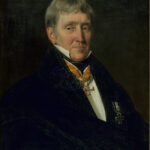We all know the stories how Haydn and Mozart influenced Beethoven’s composing and taste, but before Vienna, he was a teenager in Bonn with some very important influencers in his life. This article will discover who these people were and how they formed this genius in his youth.
No man is an island! – the saying goes.
Parents influence is evident in everyone’s life. His mother was a loving, simple person, most of the time sad and depressed. His alcoholic father was a stern, abusive father, who started teaching his son violin and clavier from the age of four. His spartan methods of teaching, his approach to the boy and his mother made Beethoven hate his father. The boy was so talented that at the age of nine there was nothing to learn from the father (musician and singer at the Court). Nevertheless, his most lasting influence on the boy was the developing and complete rejection of any authority or following rules. Without this there would never be a revolutionary Beethoven!
|Related: Articles on Beethoven’s family
Next in line was the Court organist Van Den Eeden, who was a friend to his grandfather. He started teaching the boy on daily basis how to play organ. This work was soon taken over by Christian Neefe, who was in his thirties, when he met the eleven years old Beethoven. Neefe was a remarkable musician and what is even more, he was an intellect and representative of the Enlightenment. They soon became friends and Beethoven (at the age of twelve) grew into his substitution at the organ. Neefe, after a promotion was in charge of both sacred and secular music. This opened the door for young Beethoven to play in the Court orchestra, first as cembalist (harpsichord), then as viola player.
|Related: What instruments did Beethoven play?
Franz Ries, father of later friend Ferdinand, trained him with the violin. Regardless the master, he never achieved anything more than being a basic violin player.
As we established in this article, Beethoven was not a child prodigy. Even in his teenage years he was nothing more than a talented musician, with a few – not outstanding – compositions.
Another great influence on him was Bach, whose music he studied eagerly. At age of twelve he was able to play almost all of Bach’s Well-tempered Clavichord.
Count Ferdinand Waldstein was the first aristocrat to become not only a serious supporter, but a very sincere friend, too. Waldstein was eight years older than Beethoven and he also had a significant influence on him. His social status was so high, that even his friendly attitude towards Beethoven immediately attracted others to the young musician. Waldstein later arranged the meeting with Haydn, promoted the boy to the old Master, and provided financial support to his visit and studies in Vienna. Later in 1805 Beethoven immortalized his friendship and gratitude with the Waldstein sonata (op.58). Although the Waldstein family became extinct with Ferdinand, the name will live forever by this sonata.
About the time he met the Count, he made another important acquaintance, namely with Stephan von Breuning and his family. The two young men took violin lessons from the above mentioned Ries. Ludwig soon became a family member in this cultivated and welcoming home and enjoyed special attention from the mother, Madame von Breuning. She looked after Beethoven’s intellectual development and introduced him to classic and contemporary literature, poetry and philosophy. Goethe, Schiller, Shakespeare, Homer and Plato all became the subjects of his keen interest. Learned some French, Latin and Italian, too. All this intellectual blossom was made possible only because of Madame von Breuning.
|Related: Plato on music
The Elector of Bonn, by ever expanding the cultural activities at the Court, played an important role in Beethoven’s life. Soon, the Opera of Bonn was opened. Here the young man played the viola on daily basis giving him valuable experience with orchestration, access to the best operas, dramas and other plays. The acquaintance with this high culture made a lasting influence on him.
In 1792 Ludwig van Beethoven leaves Bonn – and the teenage years – for Vienna and never returns, not event for a visit.









